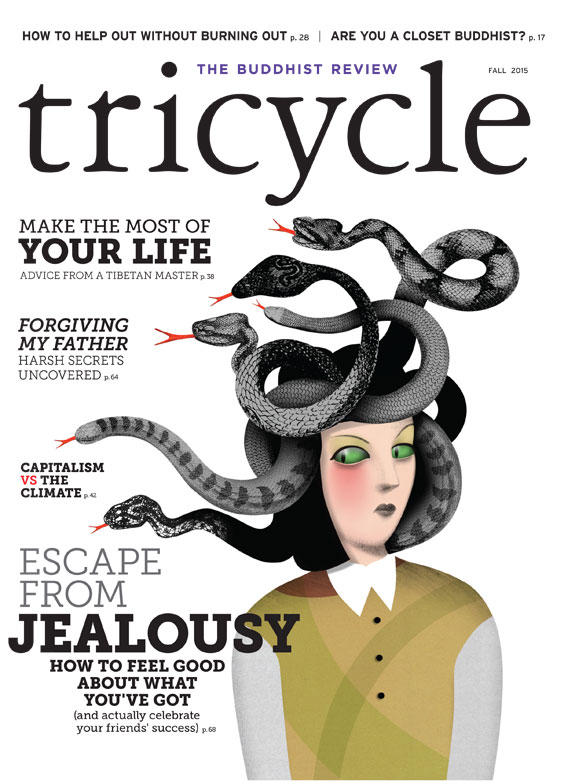We’ve run special sections on anger, on desire, on happiness. We’ve hosted online retreats on how to deal with fear or navigate romance. We’ve run countless articles delivering strategies for dealing with greed, aversion, and ignorance. But it occurred to us not long ago that we’d presented little, if anything, on two complex emotions—ones we’re unlikely to acknowledge even if we’re aware of them: jealousy and envy.
Our special section “Jealousy & Envy” pretty much takes care of this gap. You’ll find a mix of pieces running the gamut from personal narrative to traditional texts to tools for coping with bouts of these sometimes intractable emotions. And in case harsh reality proves too much, we’ve included a story from theJataka Tales (accounts of the Buddha’s former lives), rendered cartoon style.
Jealousy and envy are thought to be disfiguring emotions and have been traditionally depicted that way. No wonder, then, that in a few instances, some of those we asked to contribute to the section claimed to have little experience with them. Maybe. But for the rest of us, if we’re honest, we’ll admit we sometimes ache for what our more prosperous friends have managed to earn or just stumble upon—a second home, an early retirement, a happy marriage, a charmed life, good looks. We might even find ourselves wishing our friends ill. In “Friendvy,” Joan Duncan Oliver makes it easy to understand why we might wish to see our dearest friend at the bottom of an Alpine crevasse, while the psychologist Paul Ekman speculates as to the evolutionary purpose underlying our covetous nature. The writer Louisa Kamps makes a case for envy (“In Defense of Envy“), and Shozan Jack Haubner debunks the delusion that your teacher doesn’t feel it (“Middle Way Manager“).
If this is all seems a little gloomy, don’t abandon hope. In Buddhism, cultivating mudita—sympathetic joy—is the ideal antidote to jealousy and envy. Judith Simmer-Brown (“Transforming the Green-Ey’d Monster“) walks us through a traditional Buddhist practice that cultivates joy at others’ good fortune. In “Envidia,” Daisy Hernández finds this very practice useful for warding off el ojo malo (“the evil eye”), while for Reverend Patti Nakai, the antidote is gratitude (“Someone Is Jealous of You“).
These practices take time. Until they bear fruit, you can always fake it till you make it. For that, consult our tips. A little humor always helps.

♦
Courtesy Institut Lussato-Fédier, Brussels. Photograph by Michael Gurfinkel.
Thank you for subscribing to Tricycle! As a nonprofit, we depend on readers like you to keep Buddhist teachings and practices widely available.
